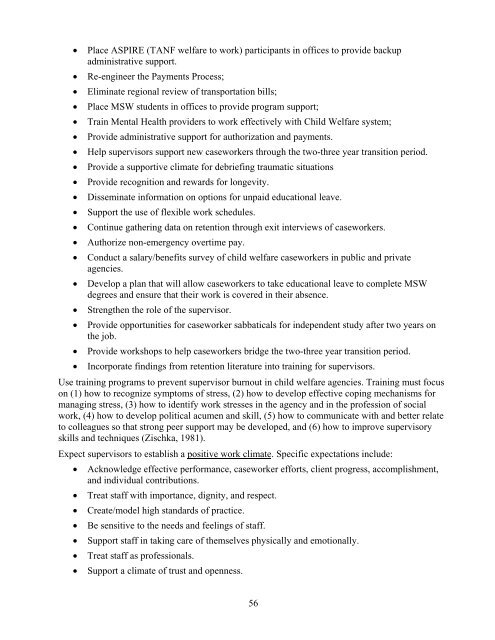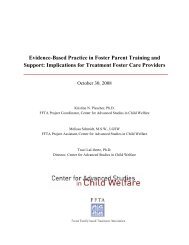Building a Model and Framework for Child Welfare Supervision
Building a Model and Framework for Child Welfare Supervision
Building a Model and Framework for Child Welfare Supervision
- No tags were found...
You also want an ePaper? Increase the reach of your titles
YUMPU automatically turns print PDFs into web optimized ePapers that Google loves.
• Place ASPIRE (TANF welfare to work) participants in offices to provide backupadministrative support.• Re-engineer the Payments Process;• Eliminate regional review of transportation bills;• Place MSW students in offices to provide program support;• Train Mental Health providers to work effectively with <strong>Child</strong> <strong>Welfare</strong> system;• Provide administrative support <strong>for</strong> authorization <strong>and</strong> payments.• Help supervisors support new caseworkers through the two-three year transition period.• Provide a supportive climate <strong>for</strong> debriefing traumatic situations• Provide recognition <strong>and</strong> rewards <strong>for</strong> longevity.• Disseminate in<strong>for</strong>mation on options <strong>for</strong> unpaid educational leave.• Support the use of flexible work schedules.• Continue gathering data on retention through exit interviews of caseworkers.• Authorize non-emergency overtime pay.• Conduct a salary/benefits survey of child welfare caseworkers in public <strong>and</strong> privateagencies.• Develop a plan that will allow caseworkers to take educational leave to complete MSWdegrees <strong>and</strong> ensure that their work is covered in their absence.• Strengthen the role of the supervisor.• Provide opportunities <strong>for</strong> caseworker sabbaticals <strong>for</strong> independent study after two years onthe job.• Provide workshops to help caseworkers bridge the two-three year transition period.• Incorporate findings from retention literature into training <strong>for</strong> supervisors.Use training programs to prevent supervisor burnout in child welfare agencies. Training must focuson (1) how to recognize symptoms of stress, (2) how to develop effective coping mechanisms <strong>for</strong>managing stress, (3) how to identify work stresses in the agency <strong>and</strong> in the profession of socialwork, (4) how to develop political acumen <strong>and</strong> skill, (5) how to communicate with <strong>and</strong> better relateto colleagues so that strong peer support may be developed, <strong>and</strong> (6) how to improve supervisoryskills <strong>and</strong> techniques (Zischka, 1981).Expect supervisors to establish a positive work climate. Specific expectations include:• Acknowledge effective per<strong>for</strong>mance, caseworker ef<strong>for</strong>ts, client progress, accomplishment,<strong>and</strong> individual contributions.• Treat staff with importance, dignity, <strong>and</strong> respect.• Create/model high st<strong>and</strong>ards of practice.• Be sensitive to the needs <strong>and</strong> feelings of staff.• Support staff in taking care of themselves physically <strong>and</strong> emotionally.• Treat staff as professionals.• Support a climate of trust <strong>and</strong> openness.56
















